Superior Food Grade Flooring WA Culinary Spaces Are Looking For
2-Year Product & Workmanship Warranty
WA's Specialised Food Grade Flooring
In WA’s bustling food industry, over 70% of health and safety incidents are related to poor flooring conditions.
It’s a staggering statistic that highlights a crucial aspect often overlooked in the hustle and bustle of food production – the importance of food grade flooring.
Many businesses face challenges with maintaining hygienic, durable, and compliant flooring in their facilities, leading to potential hazards and operational inefficiencies.
Enter PM Industries – your solution to these flooring woes. We specialize in providing top-notch flooring in WA, tailored to meet the stringent standards of the food industry.
Our flooring solutions not only enhance safety but also contribute to the overall efficiency and cleanliness of your operations.
Free Quotes Within 48 Hours
With years of experience and a deep understanding of the food industry’s unique demands, our team of experts is equipped to deliver flooring solutions that stand the test of time.
We pride ourselves on using high-quality materials and state-of-the-art installation techniques, ensuring that your flooring meets both Australian health standards and your specific business needs.
Ready to upgrade your flooring? Contact PM Industries today for a consultation or a no-obligation quote. Transform your workspace into a safer, more efficient environment with our expert services.
On this Page:
- How do I know if I need food grade flooring in WA?
- What factors affect food grade flooring costs?
- How long does the installation take?
- How can I identify a professional food grade flooring installer?
- WA What Flooring is Best Used for the Food Industry?
- What Type of Material Should Be Used for Flooring in Food Preparation Areas?
How do I know if I need food grade flooring in WA?
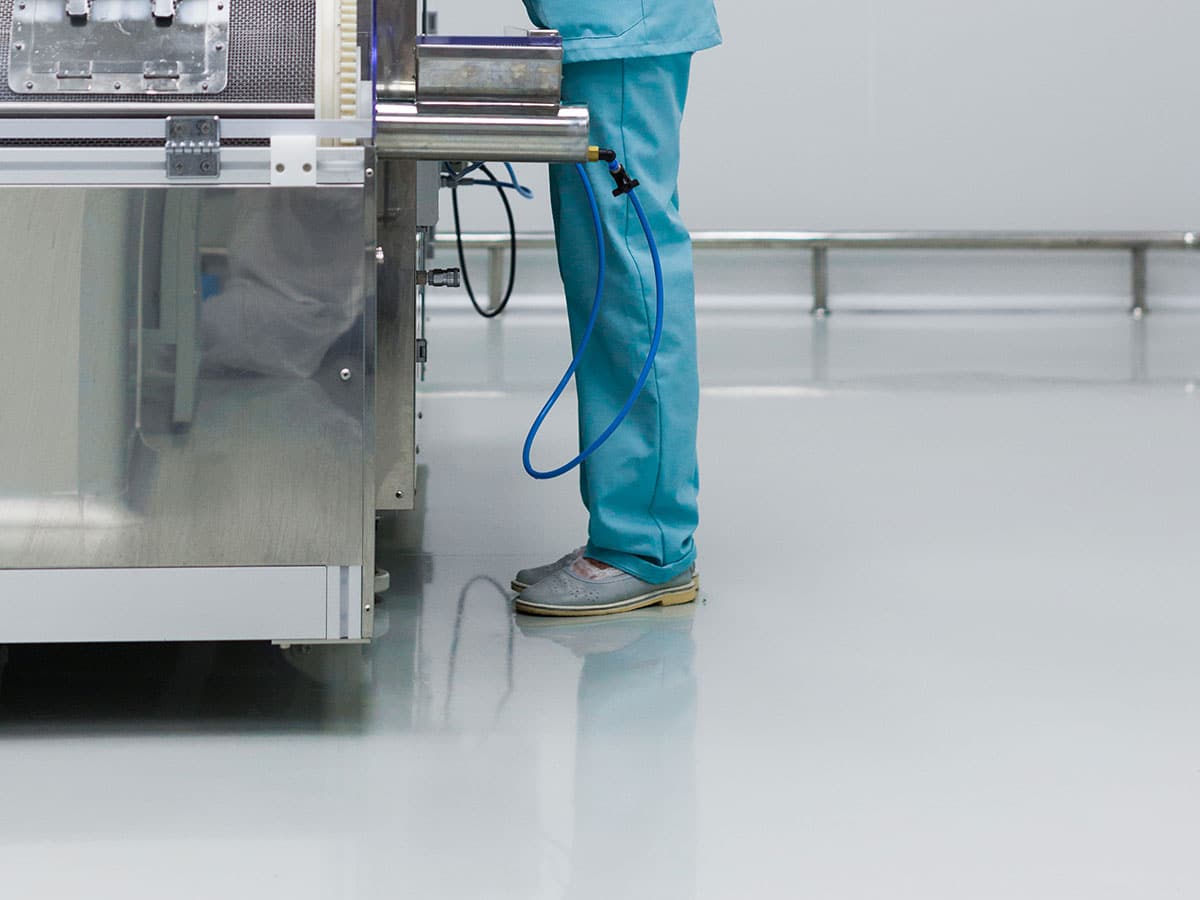
If you’re experiencing issues like rapid wear and tear, difficulty in cleaning, or non-compliance with health and safety regulations, it’s a clear sign you need to upgrade.
If you’re in the process of setting up a new facility or renovating an existing one, installing a new floor from the outset can save you from future headaches.
Food grade floor is essential for any business that handles food products, from small cafes to large-scale production facilities. It’s not just about meeting regulatory standards; it’s about ensuring a hygienic, safe, and efficient work environment.
PM Industries offers flooring solutions that cater to various needs, from anti-slip surfaces to chemical-resistant finishes, ensuring that your specific business requirements are met.
Don’t let subpar flooring compromise the quality and safety of your food products. Reach out to PM Industries for an evaluation of your current flooring situation.
Our team will provide expert advice and solutions tailored to your unique needs, ensuring that your flooring investment is a wise and beneficial choice for your business.
What factors affect food grade flooring costs?
The cost can vary significantly depending on several factors such as the size of the area, the type of flooring material, the complexity of installation, and any additional features required.
- Basic Flooring: Includes standard epoxy or polyurethane cement suitable for moderate use.
- Premium Flooring: High-grade materials with additional features like enhanced slip resistance, chemical resistance, or custom aesthetics.
Contact PM Industries today for a personalised quote that considers your unique flooring requirements, ensuring you get the best value and performance for your investment.
How long does the installation take?
The duration of installation can vary based on several factors.
Key considerations include the size of the area to be floored, the type of flooring material chosen, the condition of the existing floor, and the complexity of the installation process.
Here’s a rough guide to help you understand the typical timelines:
- Small Areas (up to 50 sqm): Installation in smaller spaces can often be completed within 1-2 days, assuming the existing floor is in good condition and preparation is minimal.
- Medium Areas (51-100 sqm): For medium-sized areas, the installation might take approximately 2-4 days. This accounts for surface preparation, application of the flooring material, and curing time.
- Large Areas (101 sqm and above): Larger projects can take a week or more. These projects often require extensive preparation, multiple layers of flooring application, and adequate curing time for each layer.
- Custom Projects: For highly customized flooring solutions or those involving complex designs, intricate patterns, or special features (like enhanced slip resistance or chemical resistance), the project timeline can extend further. Such projects demand detailed planning and execution.
It’s important to note that the curing time for the flooring material can also impact the overall timeline. While the installation might be completed in a few days, the floor might need additional time to fully cure before it can withstand regular operational use.
PM Industries ensures that every project is managed efficiently to minimize downtime for your business. Our team works diligently to complete the installation as quickly as possible without compromising on quality.
We also provide a clear timeline at the start of the project, so you have a realistic expectation of when your new flooring will be ready for use.
Contact PM Industries for a more precise timeline based on your specific requirements and let us help you plan your flooring project with minimal disruption to your operations.
How can I identify a professional food grade flooring installer?
Identifying a professional installer involves looking for several key characteristics that ensure the flooring meets the high standards required for food processing and handling environments. Here’s what to look for:
- Certification and Compliance: Professional installer should comply with Australian standards and food safety regulations. Look for certifications that indicate the flooring material is suitable for use in food processing areas.
- Hygienic and Easy to Clean: The surface should be non-porous and seamless, preventing the accumulation of bacteria, mould, and other contaminants. It should be easy to clean and maintain, withstanding regular washing and sanitization processes.
- Durability and Resistance: High-quality floor is durable and resistant to wear and tear. It should withstand heavy foot traffic, equipment movement, and potential impact from dropped objects. Additionally, it should be resistant to chemicals, temperature variations, and moisture.
- Slip Resistance: Safety is paramount in food processing areas. Professional installer should offer slip resistance to prevent accidents, especially in wet or oily conditions.
- Aesthetically Pleasing and Functional: While functionality is key, professional flooring can also be aesthetically pleasing, with options for different colours and finishes that can demarcate areas or enhance the overall look of the facility.
- Professional Installation: Proper installation by experienced professionals is crucial. A well-installed floor will have even surfaces, proper slopes for drainage where necessary, and no gaps or cracks.
- Warranty and Support: Reputable manufacturers and installers will offer a warranty for their product and installation, along with ongoing support for maintenance and repairs.
PM Industries takes pride in offering professional flooring that ticks all these boxes. Our team ensures that every flooring solution we provide meets the highest standards of quality, safety, and compliance.
With PM Industries, you can rest assured that your flooring investment is sound, hygienic, and tailored to the unique needs of your business.
For a detailed assessment and recommendation on the best flooring for your facility, contact PM Industries today. Our experts are ready to guide you in selecting the perfect flooring solution that meets both your operational and aesthetic needs.
Our Gallery of Finished Projects
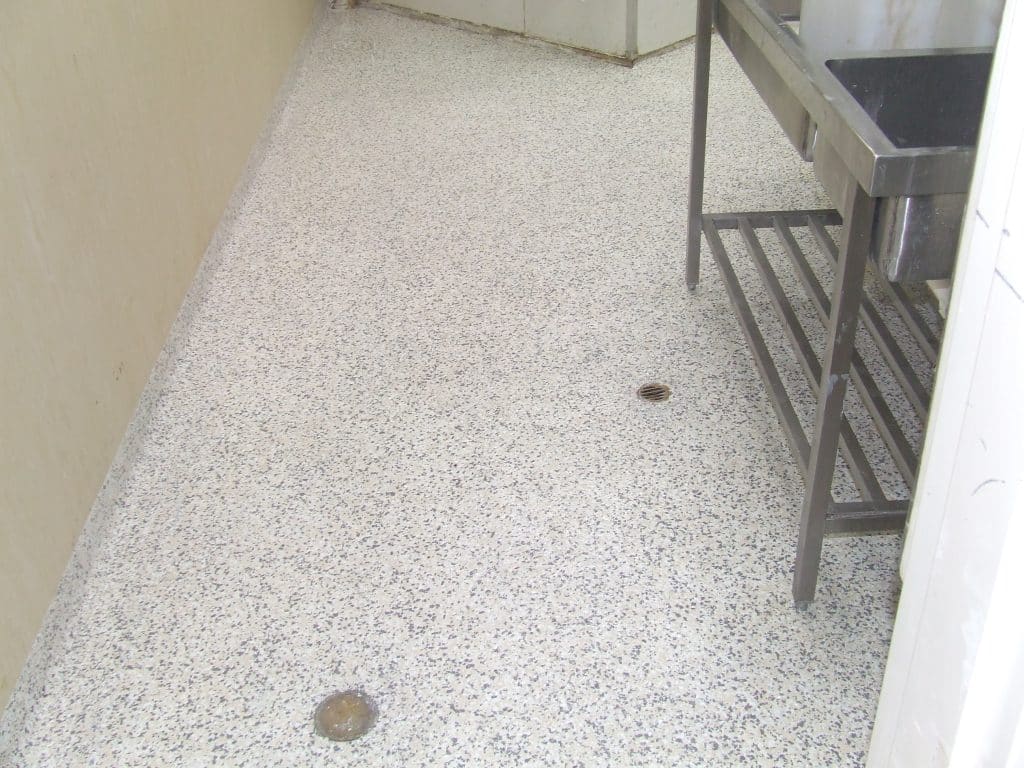
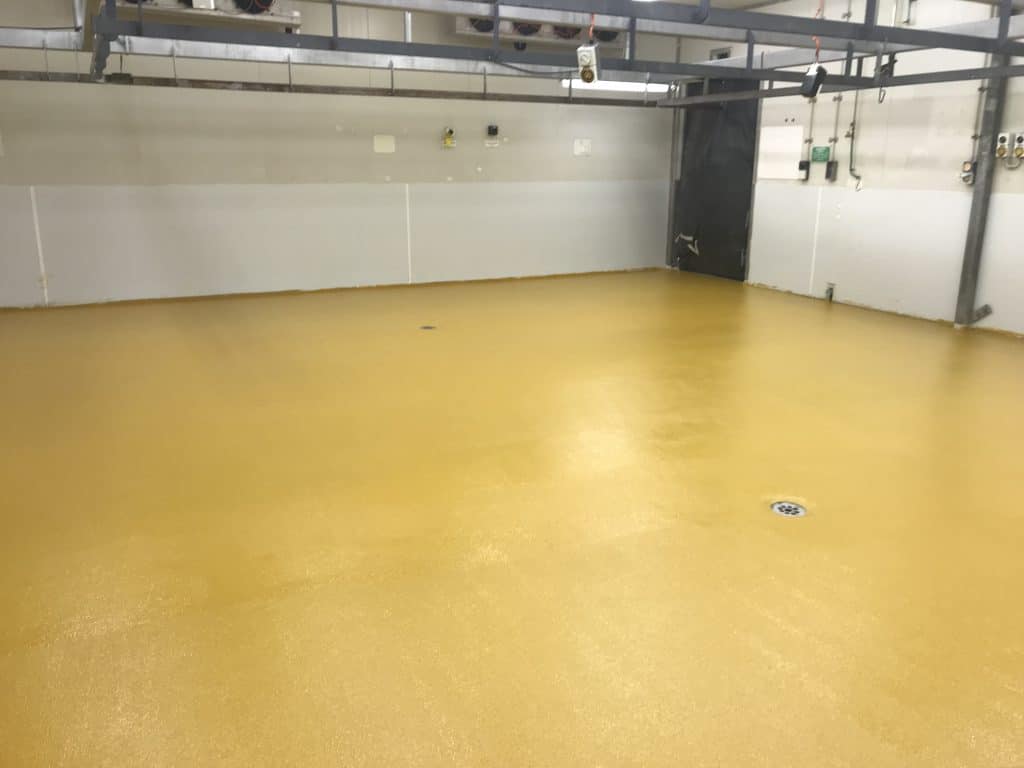
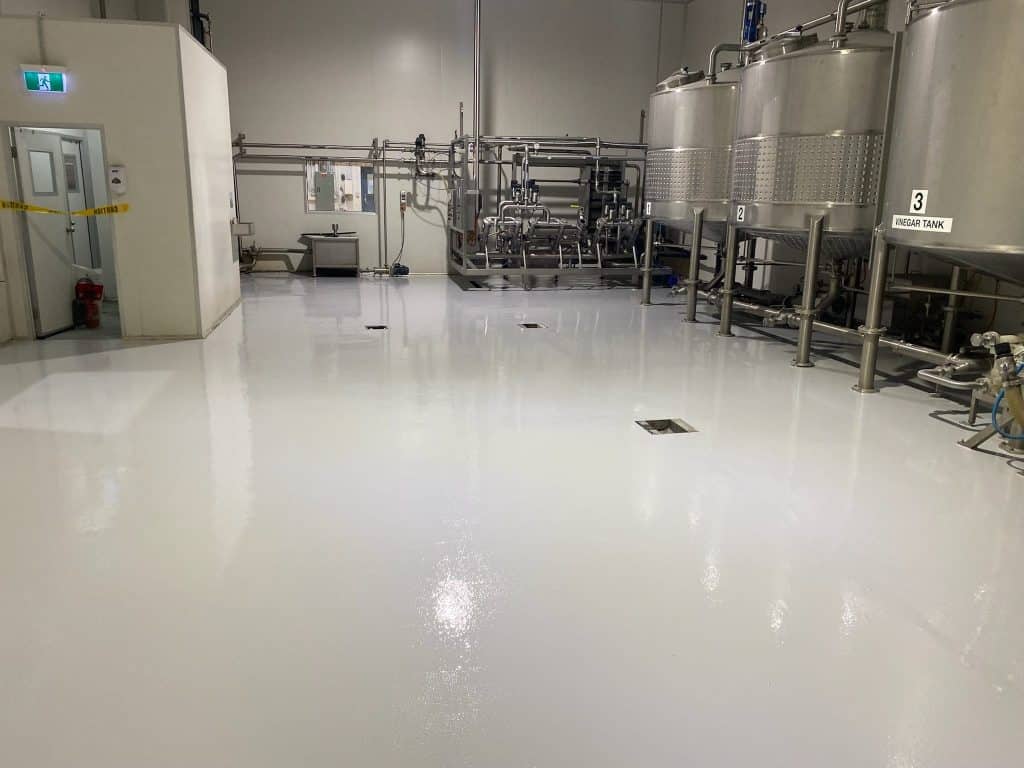
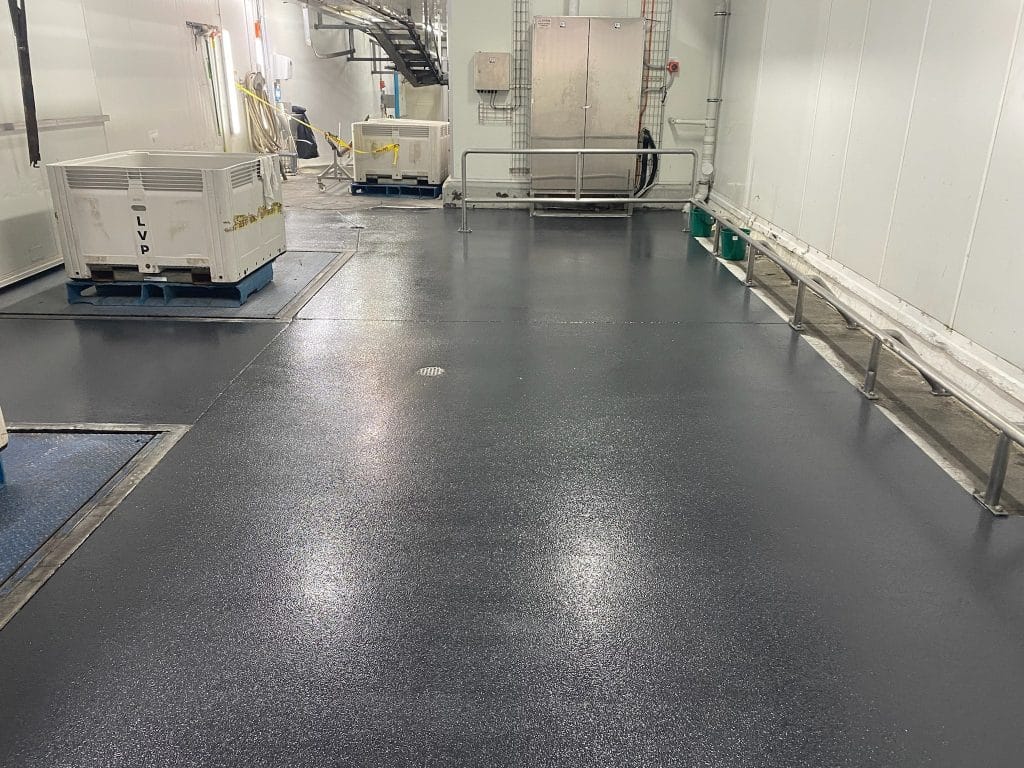
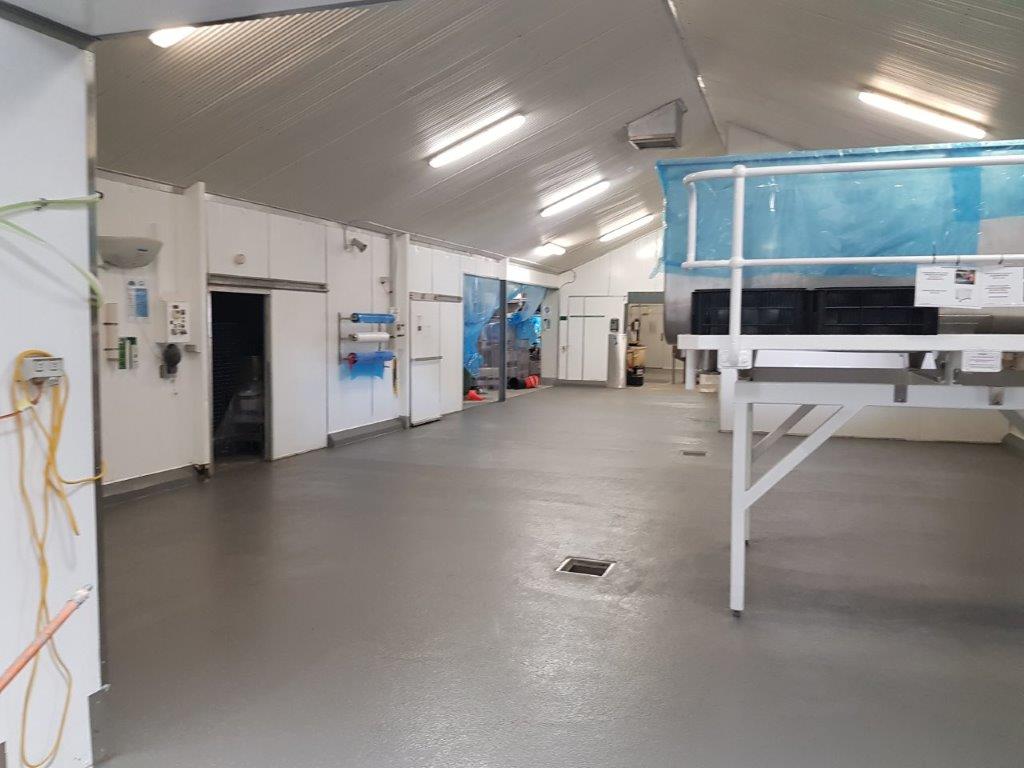


Frequently Asked Questions About Food Grade Flooring in WA
WA What Flooring is Best Used for the Food Industry?
Choosing the right flooring for the food industry is crucial for maintaining hygiene, safety, and operational efficiency. The best type of flooring depends on the specific needs of the facility, but here are some of the most recommended options:
- Epoxy Flooring: Epoxy floors are popular in the food industry due to their durability, ease of maintenance, and resistance to chemicals and temperature changes. They provide a seamless, non-porous surface that is ideal for maintaining hygiene and cleanliness.
- Polyurethane Flooring: This type of flooring is known for its robustness, especially in areas with extreme temperature variations, like cold storage rooms. It’s also resistant to chemicals and heavy wear, making it a durable choice for high-traffic areas.
- Vinyl Flooring: Vinyl is a cost-effective option that offers good durability and hygiene. It’s easy to clean and maintain, making it suitable for areas like dining spaces and light-duty kitchens.
- Anti-Slip Flooring: Safety is paramount in the food industry. Anti-slip flooring options, which can be a feature of both epoxy and polyurethane flooring systems, are essential in areas prone to spills or moisture.
- Concrete with Sealers and Densifiers: While concrete alone isn’t sufficient for food industry standards when treated with sealers and densifiers, it can become more resistant to moisture, stains, and bacterial growth.
- Tile Flooring: Certain types of tiles, like quarry tiles, can be a good choice for areas that require frequent and thorough cleaning. However, they may require more maintenance due to grout lines.
- Custom Solutions: Sometimes, a combination of materials or a custom solution might be the best fit, especially for facilities with varied zones (production areas, cold storage, packaging, etc.).
At PM Industries, we understand that each food processing facility has unique requirements.
Our team of experts can help you choose the most suitable flooring solution based on factors like your facility’s specific activities, hygiene standards, foot and machinery traffic, and budget considerations.
To explore the best flooring options for your food industry needs, reach out to PM Industries for a comprehensive assessment and tailored solution.
Our commitment is to provide flooring that not only meets industry standards but also enhances your operational efficiency and safety.
What Type of Material Should Be Used for Flooring in Food Preparation Areas?
In food preparation areas, the choice of flooring material is critical for maintaining hygiene, safety, and compliance with industry standards. Here are some of the most suitable materials for flooring in these areas:
- Epoxy Resin: Epoxy resin flooring is one of the most popular choices for food preparation areas. It’s highly durable, and seamless, and provides a non-porous surface, making it easy to clean and sanitise. Epoxy resin is also resistant to a variety of chemicals and can be formulated to provide anti-slip properties.
- Polyurethane Concrete: This material is exceptionally durable and can withstand extreme temperatures, making it ideal for kitchens and areas with hot or cold processing. Polyurethane concrete is also resistant to chemicals, impacts, and abrasions, ensuring longevity even in high-traffic areas.
- Vinyl Composite Tile (VCT): Vinyl is a cost-effective option and is suitable for less demanding areas of food preparation. It provides a clean, smooth surface that is easy to maintain. However, it may not be as durable as epoxy or polyurethane in high-impact areas.
- Quarry Tile: Quarry tile is a traditional choice for commercial kitchens due to its durability and slip resistance. It can withstand high temperatures and heavy traffic. However, it requires regular maintenance, especially in the grout lines, to prevent bacterial growth.
- Antimicrobial Treated Flooring: Some flooring materials come with antimicrobial treatments that inhibit the growth of bacteria, mould, and mildew. These are especially beneficial in food preparation areas to maintain high hygiene standards.
- Sealed Concrete with Additives: Concrete floors, when properly sealed and treated with additives, can provide a good balance of durability and hygiene. Additives can include slip-resistant textures or antimicrobial properties.
At PM Industries, we specialise in assessing and installing the most appropriate flooring materials for food preparation areas.
Our team considers factors like your facility’s specific food handling processes, cleaning routines, and safety requirements to recommend the best flooring solution.
Investing in the right flooring material for your food preparation area is essential for ensuring a safe, hygienic, and efficient work environment. Contact PM Industries for expert advice and installation services tailored to your unique needs.


